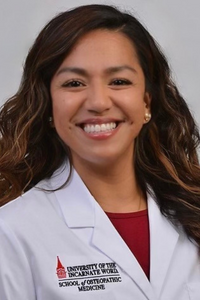Am I Latina Enough? – ¿Es Mi Latinidad Suficiente? – Connecting to My Roots Through My Community
Published October 13, 2022
Inside OME
By Jasmine Castillejos, OMS II, University of Incarnate Word School of Osteopathic Medicine, Latino Medical Student Association Chapter Vice President

Being born as a mixed-race half Peruvian and half Filipina woman fills me with pride, but also comes with much cultural conflict I was born and raised in Los Angeles, California, more specifically in an underserved Latino neighborhood, Pico Rivera, CA. In the walls of my home, we spoke Tagalog, and our table was filled with traditional dishes like menudo and champurrado, the “Filipino-kind.” Outside my home, I was immersed in a neighborhood full of tartedas, mariachis and the smell of carne asada in the air. My formative years came with a lot of insecurity, since my Peruvian father was incarcerated and later deported to Peru; thus, I felt robbed of experiencing my Peruvian roots. But because of the neighborhood I grew up in, the schools I went to and the people I was surrounded by, I felt safe enough to proactively seek out my culture on my own. And what I found was so beautiful—the community took me in whole-heartedly and helped me see the beauty and uniqueness of different cultures, all united with shared passion, warmth and camaraderie. This experience inspired me to dedicate my career to help serve the same community that raised me. I became a global health ambassador serving and connecting with not only Peruvian, but also Mexican, Honduran and Ecuadorian, communities. I was able to make a difference while gaining a first-hand experience of the varying Hispanic cultures and global health inequities, leading me to pursue medicine.
To me, Hispanic Heritage Month means perseverance and growth. As a first-generation Latina, I relocated to San Antonio, Texas and started medical school battling self-doubts. I felt as if I did not belong in this challenging field. However, I quickly gained a sense of belonging when I was given the honor and opportunity to serve as the vice president of the Latino Medical Student Association. Despite being in a new city, I felt connected and comforted by the flourishing Latinx cultures that reminded me of home. I took on the role of VP because I wanted to be a voice for the marginalized. It was inspiring to work amongst an all-female Latina executive board. These women all broke barriers and strived to share their cultures with the student body. Thus, we shared the Hispanic heritage in true Latin form—through music, socials, stories, food and medical Spanish. Kicking off the month, we launched the Latinos in Medicine Lecture Series, where we discussed the history of being Latino and being Latino in Medicine. Each week, we highlighted the stories of Hispanic student doctors who shared their backgrounds, accomplishments and what makes them proud to be Latino. From the strength of the woman who left her home country of Quisqueya, to the fearlessness and grit of the soon-to-be Latina surgeon, these personal stories of resilience and pride helped alleviate my own imposter syndrome and provided me with a deeper connection to my own culture, father and siblings.
To me, Hispanic Heritage Month is a chance to celebrate the strength of our community and to be inspired by those who have paved the way before us; thus, we are able to empower the next generation of leaders and luchadores, to unapologetically achieve their own dreams and continue to make an impact in every room they enter.
